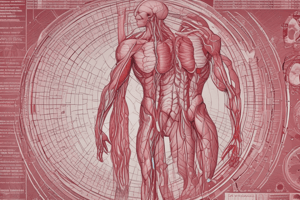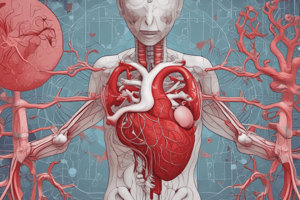Podcast
Questions and Answers
What is the primary function of albumins in plasma?
What is the primary function of albumins in plasma?
- Transport oxygen
- Defend against pathogens
- Aid in blood clotting
- Maintain osmotic pressure (correct)
What is the main difference between plasma and serum?
What is the main difference between plasma and serum?
- Serum contains clotting factors, while plasma does not
- Plasma is obtained from whole blood, while serum is obtained from serum separation
- Plasma is obtained from serum separation, while serum is obtained from whole blood
- Plasma contains clotting factors, while serum does not (correct)
What is the primary function of red blood cells (erythrocytes)?
What is the primary function of red blood cells (erythrocytes)?
- Aid in blood clotting
- Regulate body temperature
- Transport oxygen and partially carbon dioxide (correct)
- Defend against pathogens
What is the lifespan of red blood cells (erythrocytes)?
What is the lifespan of red blood cells (erythrocytes)?
What is the primary function of globulins in plasma?
What is the primary function of globulins in plasma?
What is the function of fibrinogen in blood clotting?
What is the function of fibrinogen in blood clotting?
What is the primary function of platelets in the blood?
What is the primary function of platelets in the blood?
What is the term for the production of red blood cells in the bone marrow?
What is the term for the production of red blood cells in the bone marrow?
What is the term for the proportion of red blood cells in the blood?
What is the term for the proportion of red blood cells in the blood?
Which type of white blood cell is responsible for combating parasites and involved in allergic reactions?
Which type of white blood cell is responsible for combating parasites and involved in allergic reactions?
What is the term for the breakdown of blood clots to restore normal blood flow?
What is the term for the breakdown of blood clots to restore normal blood flow?
Where is the antigen for ABO blood group classification found?
Where is the antigen for ABO blood group classification found?
Flashcards are hidden until you start studying
Study Notes
Functions of Blood
- Blood transports oxygen, nutrients, hormones, and waste products throughout the body.
- Regulates body temperature, pH balance, and fluid balance.
- Protects the body by containing white blood cells for defense against pathogens and platelets for blood clotting.
Components of Whole Blood
- Plasma: the liquid portion of blood, consisting of water, electrolytes, proteins, and other solutes.
- Formed Elements: red blood cells, white blood cells, and platelets.
Components of Plasma
- Water: the majority component, serving as a solvent for other substances.
- Proteins: include albumin, globulins, and fibrinogen.
- Electrolytes: include sodium, potassium, chloride, calcium, and bicarbonate.
- Nutrients: include glucose, amino acids, lipids, and vitamins.
- Waste Products: include urea, creatinine, and bilirubin.
- Hormones: chemical messengers.
- Gases: include oxygen and carbon dioxide.
Plasma and Proteins
- Albumins: maintain osmotic pressure and are produced by the liver.
- Globulins: include immunoglobulins (antibodies).
- Fibrinogen: a glycoprotein that aids in blood clotting by forming fibrin.
Serum vs. Plasma
- Plasma: contains clotting factors.
- Serum: plasma minus clotting factors, collected after blood clots.
Formed Elements of Blood
- Red Blood Cells (Erythrocytes): biconcave discs that transport oxygen and have a lifespan of 120 days.
- Platelets (Thrombocytes): fragments from megakaryocytes, essential for clotting.
- White Blood Cells (Leukocytes): involved in immune response.
Oxygenated vs. Deoxygenated Blood
- Oxygenated Blood: high oxygen, bright red, found in systemic arteries and pulmonary veins.
- Deoxygenated Blood: low oxygen, dark red or bluish, found in systemic veins and pulmonary arteries.
Blood Conditions
- Anemia: low red blood cell count.
- Polycythemia: high red blood cell count.
Erythropoiesis
- Production of red blood cells in bone marrow, regulated by erythropoietin.
Hematocrit
- Proportion of red blood cells in blood, higher in males.
- Assessed in a complete blood count (CBC).
Leukocytes (White Blood Cells)
- Neutrophils: first responders, engulf bacteria.
- Lymphocytes: involved in adaptive immune response.
- Types of Lymphocytes: B cells, T cells, NK cells, Monocytes, Eosinophils, Basophils.
CBC and CBC Diff
- CBC: measures red blood cells, white blood cells, and platelets.
- CBC Diff: breaks down white blood cell types, used to diagnose and monitor health conditions.
Platelets (Thrombocytes)
- Morphology: small, disc-shaped, no nucleus.
- Precursor Cell: megakaryocytes.
- Function: blood clotting, forming plugs, and releasing clotting chemicals.
- Thrombopoietin: hormone regulating platelet production.
Hematopoiesis
- Location: bone marrow.
- Hematopoietic Stem Cells: multipotent cells producing all blood cell types.
Hemostasis
- Vascular Spasm: immediate vessel constriction post-injury.
- Platelet Plug: platelets adhere to the injury site, forming a plug.
- Coagulation: fibrin formation stabilizes the plug into a clot.
Hemorrhage
- Excessive blood loss from the circulatory system.
Fibrinolysis
- Clot breakdown by plasmin to restore normal blood flow.
Blood Group Classification
- ABO classification: antigen found on the surface of red blood cells.
- ABO classification: antibody found in the plasma (or serum) of the blood.
- Rh classification: antigen found on the surface of red blood cells.
- Rh classification: antibody found in the plasma (or serum) of the blood.
Universal Donor Blood
- Type O negative blood is considered the universal donor type.
Studying That Suits You
Use AI to generate personalized quizzes and flashcards to suit your learning preferences.



